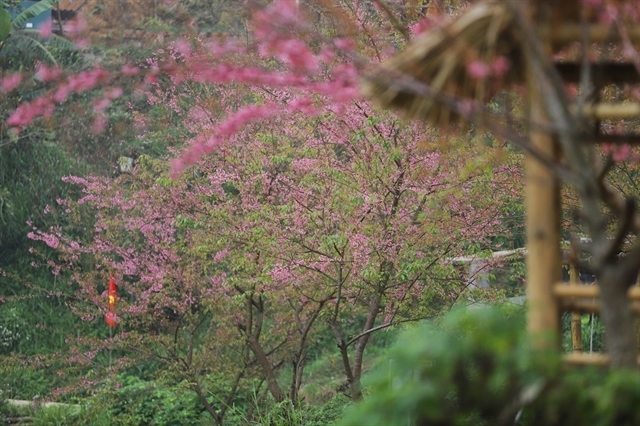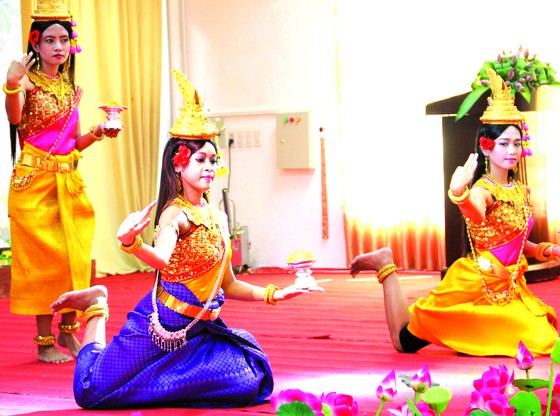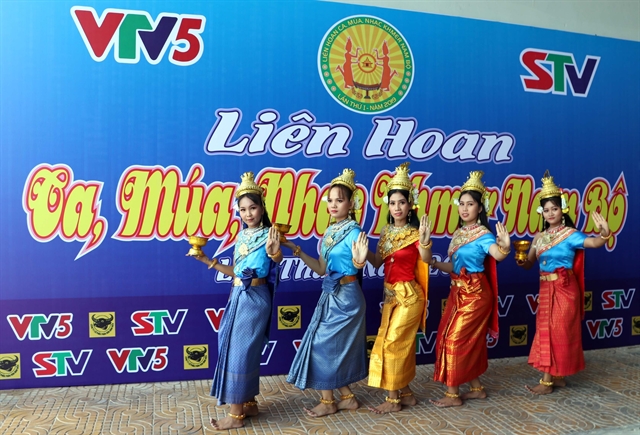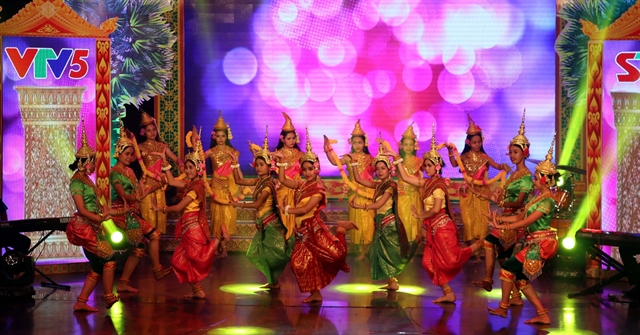 Features
Features

With the introduction of modern musical forms, the folk music of ethnic Khmer in the southern region has encountered multiple problems retaining its popular status.

|
| Artists perform a traditional Khmer dance on stage. VNS File Photo |
by An Phương
With the introduction of modern musical forms, the folk music of ethnic Khmer in the southern region has encountered multiple problems retaining its popular status.
Khmer arts in the south have undergone a long process of development and created a unique identity. Khmer folk music has always been supported by locals since it contains different types of music with melodies associated with the rhythm of daily life, communal activities and festivals.
The variety of musical forms include the pentatonic orchestra, Mhôry orchestra, wedding orchestra, Sa dam drum performance, À day singing, and lullabies, among other categories.
The music has been 'spiritual food' for the Khmer people for many generations.
Composer Thạch Mu Ni from Trà Vinh Province says that in the musical form Chầm Riêng Chà Pây, the performer sings and plays Chà pây instruments at the same time.
The performer conducts singing as a way of storytelling with content sometimes filled with humour to excite the audience.
The songs’ content is usually about fairy tales, myths and folklore that guide locals to be good people.
This special, expressive type of performance in 2013 was listed by the Ministry of Culture, Sports and Tourism as a part of national intangible cultural heritage.
Another significant type of Khmer music is À day, which involves singing in dialogue between men and women.
Though its most common form is a duet performance, À day trio and quartet singing are often performed during the Tết (Lunar New Year) holiday.

|
| The classical Khmer dance group from Trà Vinh University won first prize at the first Southern Khmer Music Festival held in April in Sóc Trăng Province. VNA/VNS File Photo |
“Ethnic Khmer groups in the south have inherited a priceless cultural heritage from their ancestors,” Sơn Ngọc Hoàng, vice principal of the Sóc Trăng Province’s School of Culture and Arts, says.
“Throughout history, Khmer musical instruments carry a positive meaning in the life of the Khmer community, enriching traditional Vietnamese music,” he adds.
Meanwhile, Meritorious Artist Thạch Mô Ly from Cao Văn Lầu Theatre says that Khmer folk music should be preserved because folk music plays an important role in the life of ethnic Khmer in southern provinces.
Fading through time
Despite its uniqueness, Khmer folk music has become less popular due to the introduction of Western and more modern music genres.
Experts have agreed that some types of ethnic Khmer music are on the edge of losing their identity.
Meritorious Artist Thạch Mô Ly says he is concerned that the number of artists performing Khmer music has declined throughout the years.
Fewer young people, especially ethnic Khmer, are interested in learning folk music, she says, adding that the lack of research and promotion of Khmer music contributes to its unpopular status.
Bùi Công Ba from the Department of Culture and Information in Kiên Giang Province says that he has encountered problems due to limited funding, together with the lack of artists and instruments.
Many Khmer pagodas in Kiên Giang do not have a sufficient number of folk musical instruments as well as cultural institutions necessary for the ethnic minority to thrive, he adds.

|
| The first Southern Khmer Music Festival in Sóc Trăng Province attracted more than 120 entries. VNA/VNS File Photo |
Phạm Thị Tố Thy from Trà Vinh University says that though the University is the only official institution that has a course on performing Khmer instrumental music, the number of people enrolled remains limited, with only 29 students between 2012 and 2019.
Thy says that authorities should carry out specific measures to raise locals’ awareness about the urgency of preserving the beauty of Khmer music in southern provinces, especially in universities, art schools and other institutions.
The state should also call for investment to restore a number of special Khmer music types such as Chầm riêng Chà pây, children's songs and lullabies, she says.
Conservation of ethnic Khmer music should go hand in hand with development of local tourism, she adds.
According to Vice Principal Hoàng, preserving and promoting ethnic Khmer music is important in an era of international integration.
Preserving the cultural values of Khmer music requires a policy that helps locals become truly aware of the precious heritage that has been passed down by their ancestors. VNS